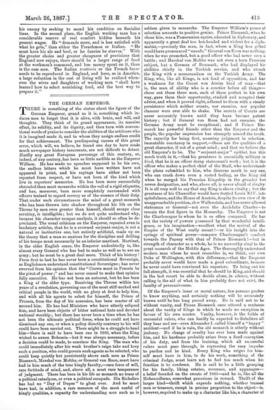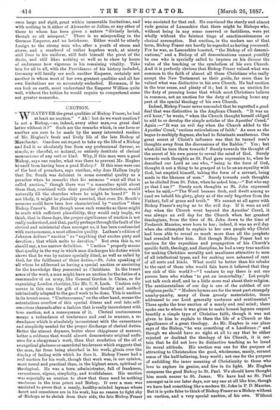THE GERMAN EMPEROR.
THERE is something of the statue about the figure of the German Emperor, grand as it is, something which in- duces men to forget that it is alive, with brain, and will, and thoughts. They think of its grand appearance, its massive effect, its solidity, and its dignity, and then turn with conven- tional words of praise to consider the abilities of the artificers who it is imagined made it, and to whom they assign endless credit for that achievement. The predisposing causes of this great error, which will, we believe, be found one day to have made much newspaper history inaccurate, are not difficult to detect. Hardly any great European personage of this century, or, indeed, of any century, has been so little audible as the Emperor William. He has made no speeches supposed to be his own, the endless letters which he must have written have not appeared in print, and his sayings have either not been reported from respect, or have not been of the kind which live in reporters' memories. He has been more successfully shrouded than most monarchs within the veil of a rigid etiquette, and has, moreover, been more completely surrounded with officers trained to regard secrecy as of the essence of their duty. That under such circumstances the mind of a great monarch who has been thrown into shadow throughout his life on the Throne by men even greater than himself, should escape close scrutiny, is intelligible ; but we do not quite understand why, because his character escapes analysis, it should so often be de- preciated. The usual criticism on the Emperor, repeated even in laudatory articles, that he is a crowned serjeaut-major, is not a natural or instinctive one, bat entirely artificial, made up on the theory that a man so anxious for the discipline and drilling of his troops must necessarily be an inferior martinet. Martinet, in the older English sense, the Emperor undoubtedly is, like almost every General who has had to make as well as to use an army ; but he must be a great deal more. Think of his history ! From first to last he has never been a constitutional Sovereign, as Englishmen understand constitutional Sovereigns ; has never swerved from his opinion that the " Crown must in Prussia be the pivot of power ;" and has never ceased to make that opinion fully executive. He has not been an autocrat, but he has been a King of the older type. Receiving the Throne within ten years of a revolution, governing one of the most stiff-necked and critical people in the world, with no glory at first to help him, and with all his agents to select for himself, the Prince of Prussia, from the day of his accession, has been master of all around him. He has had Ministers who have utterly eclipsed him, and have been objects of bitter national hate and devoted national worship ; but there has never been a time when he has not been the ultimate political force, when he could not have dismissed any one, or when a policy directly contrary to his will could have been carried out. There might be a struggle to bend him—there is said to have been one in 1866, when the King wished to annex Bohemia—but it was always necessary, before a decision could be made, to convince the King. The man who could immediately after his weak brother's reign take and keep such a position, who could govern such agents as he selected, who could keep quietly but persistently above each men as Prince Bismarck, Marshal von Moltke, or General von Boon, must have had in him much of the true kingly faculty,—rare force of will, rare fortitude of mind, and, above all, a most rare temperance of judgment. There has been in his life as monarch no trace of a political cataclysm, or even a political escapade. His Richelieu has bad no "Day of Dopes" to gloat over. And he must have bad, in addition, a rare measure of the moat useful of kingly qualities, a capacity for understanding men such as is seldom given to monarchs. The Emperor William's power of selection amounts to positive genius. Prince Bismarck, when he chose him, was a Pomeranian squire, educated in diplomacy, and apparently a great deal too hot-headed and violent for a diplo. matist,—precisely the man, in fact, whom a King less gifted would have pronounced "unsafe." General von Roon was nothing, when he was promoted, but a good officer who had never seen a battle; and Marshal von Moltke was not even a born Prussian subject, but a German of Denmark, who had displayed his abilities chiefly in the Turkish service, and who struck the King with a memorandum on the Turkish Army. The King, who, like all Kings, is not fond of opposition, and has a weakness for the Count von Arnim kind of man—that is, the man of ability who is a courtier before all things— chose out these three men, each of them perfect in his own way, gave them their opportunity, studied and accepted their advice, and when it proved right, adhered to them with a steady persistence which neither events, nor enemies, nor popular clamour were ever able to shake. The secrets of Courts are never accurately known until they have become patent history ; but if General von Roon had not enemies, the German Army mast be exceptional ; and if Prince Bis- marck has powerful friends other than the Emperor and the people, the popular impression has strangely missed the truth. The capacity for being first, unerring judgment in selection, immutable constancy in support,—these are the qualities of a great character, if not of a great mind ; and that we believe the old Emperor's to be. The " serjeant-major " epithet has this much truth in it,—that his greatness is essentially military in kind, that he is an officer doing statesman's work ; but it is the officer who makes a perfect chief of the Staff, who understands the plans submitted to him, who discerns merit in any one, who can crush down even a rooted feeling, as the King did when he merged his Prussian Kingship in the grander but newer designation, and who, above all, is never afraid of rivalry. It is all very well to say that any King is above rivalry ; but the greatness of his Chancellor would have fretted Louis XIV. into spitefulness, and the House of Austria, despite its own view of its unapproachable position, slew Wallenstein, and has never allowed statesman or General—not even the Archduke Charles—to remain the first figure in the Monarchy. The Emperor is not the Charlemagne to whom he is so often compared. He has not the variety of powers possessed by that wonderful intelli- gence, or his imagination—recollect what the revival of the Empire of the West really meant !—or his insight into the springs of spiritual power—compare Charlemagne's conduct towards the Papacy with that of Prince Bismarck !—but in strength of character as a whole, he is no unworthy rival to the great monarch of the Middle Ages. The thoroughly understood modern man whom he most resembles is, we think, our own Duke of Wellington, with this difference,—that the Emperor probably never would have made a good subordinate, because he never could have convinced his superiors. To bring out his full strength, it was essential that he should be King, and should in the last resort be able to decide alone, in silence, without calling in the aid of what in him probably does not exist, the faculty of persuasiveness.
Of the Emperor's inner or moral nature, few persons profess to know anything, and certainly nothing will be accurately known until he has long passed away. He is said not to be without vanity, and Prince Bismarck once uttered a sentence about the vanity of Kings in which ho made no exception in favour of his own master. Vanity, however, is the foible of successful rulers, who can hardly be expected to disbelieve all they hear and see—even Alexander I. called himself a "happy " accident—and if he is vain, the old monarch is utterly without jealousy. No charge of cruelty has ever been made against him, and his hardness probably arises from a fixed conception of his duty, and from the training, which all successful rulers must pass through, in repressing the easy impulse to pardon and be kind. Every King who reigns for him- self must have in him, to do his work, something of the criminal Ridge, must learn not to feel too much when his function is to condemn. He is said to be a little grasping for his family, liking estates, revenues, and appanages- a belief founded on the events of 1866—and he is, like all the Hohenaollerns, somewhat penurious in reward. Thrift of the larger kind—thrift which expends nothing, whether trained men or treasure, except in precise proportion to the object—is, however, required to make up a character like hie, a character at
once large and rigid, great within immovable limitations, and with nothing in it either of Alexander or Julius, or any other of those to whom has been given a nature "divinely lavish, though so oft misspent." There is no misspending in the German Emperor, and no lavishness. Either would be utterly foreign to the strong man who, after a youth of storm and .stress, and a manhood of rather hopeless work, at ninety still lives in his uniform, still feels himself the pivot of the State, and still likes nothing so well as to show by hours of endurance how vigorous is his remaining vitality. Take him for all in all, with the Providences of his history included, Germany will hardly see such another Emperor, certainly not • another in whom most of her own greatest qualities and all her own limitations are so accurately embodied. Hermann, if he can look on earth, must understand the Emperor William quite well, without the tuition he would require to comprehend some not greater monarchs.















































 Previous page
Previous page